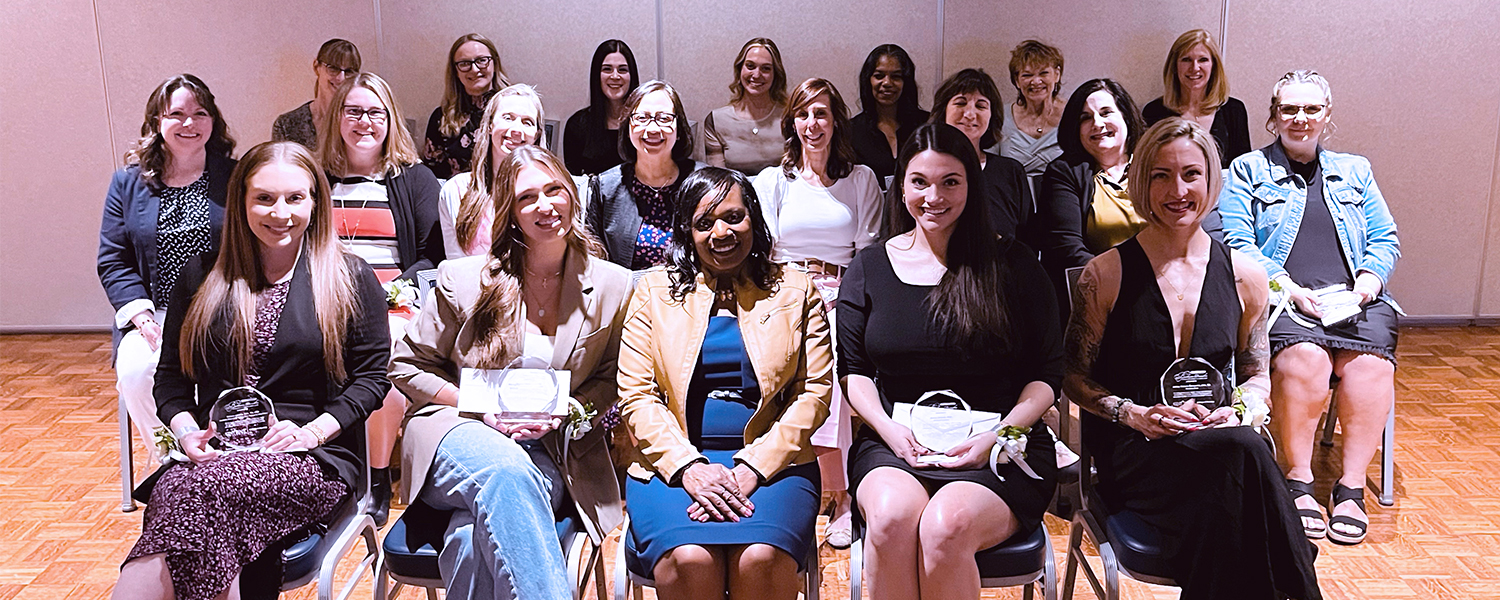Nineteen northeast Ohio nurses, known as preceptors, were honored on Thursday, April 17, at √ŘŐ“ ”∆Ķ College of Nursing‚Äôs‚ÄĮ19th‚ÄĮAnnual Barbara Donaho Distinguished Leadership in Learning Awards.‚ÄĮThe honorees represented seven hospitals, clinics, health networks, private medical practices and public health agencies. Nominated by nursing students, this‚ÄĮprestigious‚ÄĮaward recognizes exceptional nurses,‚ÄĮphysicians‚ÄĮand healthcare administrators‚ÄĮfor‚ÄĮvolunteering their time to‚ÄĮmentor and‚ÄĮtrain √ŘŐ“ ”∆Ķ State‚Äôs nursing students in clinical settings.
Preceptors play an essential and deeply influential role in the education and development of future nurses. These experienced, knowledgeable health professionals serve not only as clinical supervisors but also as trusted mentors, educators and role models. They are a bridge between classroom theory and real-world nursing practice. In the clinical settings, preceptors are the ‚Äúgo-to‚ÄĚ people for nursing students, providing guidance, support and coaching through the complexities of patient care. Their expertise and insight help students translate theoretical knowledge and research findings into effective, compassionate problem-solving in a fast-paced, ever-changing healthcare environment.
Beyond teaching clinical skills, preceptors foster professional growth. They help future nurses build confidence, develop critical thinking and cultivate the communication and decision-making skills necessary to thrive in a nursing career. By modeling professional behavior and ethical practice, they also shape the values and standards of the nursing workforce.
‚ÄúPrecepting nursing students is no small task. It‚Äôs a tremendous responsibility - one that plays a vital role in shaping the competence, confidence and compassion of our future nurses,‚ÄĚ said Chrissy Kauth, Ph.D., RN, associate dean of faculty affairs at √ŘŐ“ ”∆Ķ State's College of Nursing. ‚ÄúWe are truly grateful for the opportunity to acknowledge the profound impact these nursing professionals have on the next generation.‚ÄĚ
Guest speaker Faye Gary, EdD, RN, FAAN - The Medical Mutual of Ohio √ŘŐ“ ”∆Ķ W. Clapp Chair and professor of nursing at Frances Payne Bolton School of Nursing and university professor, Department of Psychiatry, School of Medicine at Case Western Reserve - addressed the audience with remarks about what makes an exceptional preceptor.
Gary, a longtime friend of Donaho, highlighted three key qualities that define excellent preceptors: unwavering commitment to quality care and excellence, exceptional clinical competence combined with strategic leadership skills, and genuine compassion that transforms how they lead and support others. She went on to emphasize that preceptors don't just achieve individual success but create lasting impact by inspiring future generations and strengthening the entire nursing profession.
‚ÄúWhat sets preceptors apart is what they do and how they do it. Preceptors lead with empathy. They listen. They understand. Whether comforting a patient or supporting a colleague, their kindness is constant, genuine, and deeply felt. In the preceptor‚Äôs world, compassion isn‚Äôt just a soft skill; it‚Äôs a leadership principle,‚ÄĚ Gary said.‚ÄĮ‚ÄúWe don‚Äôt just celebrate their achievements; we celebrate their impact. Because of preceptors, the nursing profession - and all of us - are healthier and better.‚ÄĚ
Following‚ÄĮGary‚Äôs remarks, recipients‚ÄĮreceived‚ÄĮan engraved award as‚ÄĮthe evening‚Äôs‚ÄĮMistress of Ceremonies,‚ÄĮLouise Knox, DNP,‚ÄĮAPRN,‚ÄĮFNP-BC, professor‚ÄĮat √ŘŐ“ ”∆Ķ College of Nursing, read their‚ÄĮnominations aloud.‚ÄĮ
Named after Barbara A.‚ÄĮDonaho, a long-time friend and supporter of √ŘŐ“ ”∆Ķ State and the College of Nursing, the award signifies the preceptors‚Äô‚ÄĮimpact on‚ÄĮnursing‚ÄĮstudents and future nursing leaders. The college‚ÄĮhas‚ÄĮrecognized‚ÄĮmore than 400 outstanding preceptors‚ÄĮsince the awards‚Äô inception.
Preceptors’ willingness to share their time, knowledge and wisdom with nursing students ensures that the next generation of nurses enters the field not only with competence, but with a strong foundation of clinical judgment, compassion and professionalism. Their role in nursing education is not only important - it is indispensable.

